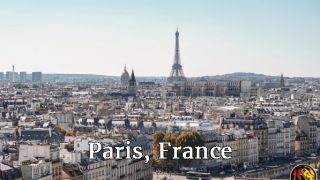
By Stefan J. Bos, Chief International Correspondent Worthy News
PARIS (Worthy News) – French president Emmanuel Macron held crisis talks late Monday with crucial cabinet ministers to discuss the “Operation Paris Siege” by hundreds of thousands of French farmers to protest the European Union-driven “excessive” environmental regulations, taxes, and low pay.
As it became clear the farmers planned to encircle Paris, the capital, with tractors and other means, Prisca Thevenot, a government spokesperson, confirmed that the “whole government and the president are mobilized.”
Separately, Interior Minister Gérald Darmanin said 15,000 police and gendarmes had been mobilized to prevent the tractors from entering Paris and other cities where protests were happening.
He stressed it was crucial to keep access open to Charles de Gaulle-Roissy airport north of the city and Orly airport in the south, as well as the region’s main fresh food market at Rungis, the largest in Europe.
He warned farmers that blocking Rungis, which supplies 60 percent of Paris’s fresh food to about 12 million people, would be crossing a red line.
However, despite the warnings, witnesses said eight main motorways into the city have been paralyzed.
By Monday evening, there were 97 miles (156 kilometers) of traffic jams reported on the motorways. The National Federation for Road Transport confirmed that the blockages had hit deliveries, but it was too early to quantify the impact.
It stressed the importance of protecting transporters and their goods and the right for them to circulate. The authorities were advising drivers to cancel or postpone all non-essential road travel.
Farmers in France, the EU’s biggest agricultural producer, say they are being strangled by EU and French bureaucracy and regulations and claim the traditional way of rural life is facing collapse.
Especially the country’s thousands of independent producers argue to seek fairer prices for produce, the continuation of subsidies on the agricultural diesel used to run their tractors and other vehicles, and financial aid for organic farmers.
Large imports from Ukraine, for which the EU waived quotas and duties since Russia’s invasion, and renewed negotiations to conclude a trade deal between the EU and South American bloc Mercosur, increased anger about perceived unfair competition in sugar, grain, and meat.
The imports are resented for pressuring European prices while not meeting environmental standards imposed on EU farmers.
Farmers take issue both with EU subsidy rules, such as an incoming requirement to leave 4 percent of farmland fallow, and what they see as France’s overcomplicated implementation of EU policy, such as in restoring hedges.
Green policies are seen as contradicting goals to become more self-sufficient in the production of food and other essential goods due to Russia’s invasion of Ukraine.
Rows over irrigation projects and criticism about animal welfare and pesticides have heightened feelings among an aging French farmer population as being disregarded by society.
There have also been farmers’ protests in Germany, Belgium, and the Netherlands over a variety of concerns ranging from subsidies being cut to strict environmental rules.
Copyright 1999-2026 Worthy News. This article was originally published on Worthy News and was reproduced with permission.
Latest News from Worthy News
The Trump administration has finalized a sweeping reciprocal trade agreement with Taiwan, confirming a 15 percent U.S. tariff rate on Taiwanese imports while securing broad new market access and purchase commitments for American goods.
Democrats are applauding White House border czar Tom Homan’s Thursday announcement that immigration enforcement operation in Minnesota will end next week.
Democrats in the U.S. Senate tanked the Homeland Security full-year funding bill in a last-ditch vote Thursday, all but guaranteeing a partial government shutdown starting Saturday.
Mourners in a remote Canadian town grappled Thursday with the aftermath of one of the country’s deadliest school shootings in decades, as families, survivors and leaders reacted to the tragedy that left eight victims — most of them children — dead, along with the 18-year-old suspect.
A gunman who opened fire at a school in southern Thailand’s Hat Yai city on Wednesday wounded a teacher and a student before being detained, authorities said, in a rare attack that sent students and staff into panic.
The Republican-led House of Representatives has passed the Safeguard American Voter Eligibility (SAVE) America Act, advancing legislation that would require proof of citizenship to register to vote and photo identification at the polls. The bill now heads to the Senate, where its future remains uncertain amid strong Democratic opposition.
Israel’s Ministry of Defense announced on Wednesday that its advanced David’s Sling air and missile defense system has completed a series of complex modernized tests, a development officials say bolsters the country’s defensive posture as tensions with Iran escalate and the United States prepares military options that could include direct strikes.







